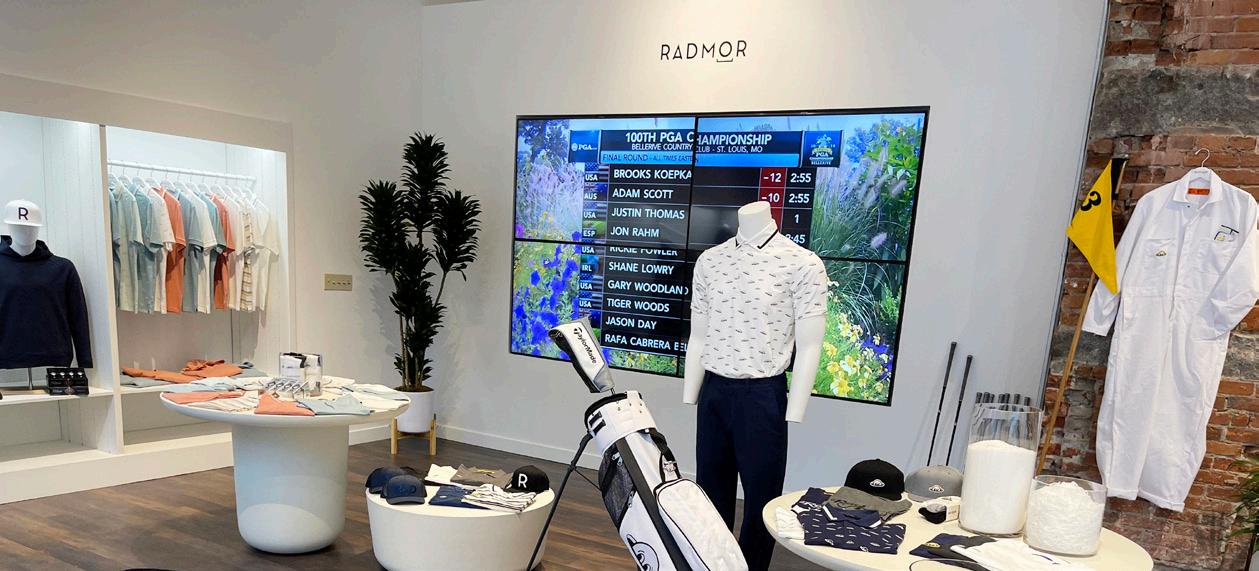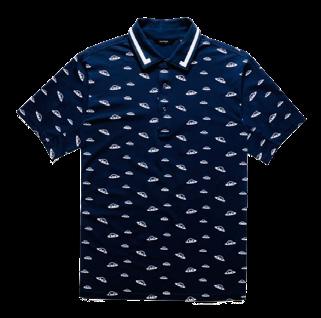
8 minute read
PRODUCT FOCUS
Sustainable Style
Radmor Golf wants you to save the planet — and look good doing it
he moment you walk into Radmor Golf, the new boutique in Seattle’s Pioneer T Square downtown district, the collection of hats, polos, sweatshirts, and jackets pops out. But you might not immediately be able to put your finger on why. It’s all familiar, but new — like a cover song you’re starting to like more than the original.
Explaining this business venture is going to take some unpacking. Rule No. 1 when buying golf attire: Make sure your clothes function properly during a round of golf. Rule No. 2: Make sure your clothes are comfortable. Radmor has added Rules 3 and 4: Make sure they look good, and make sure they’re sustainable.
Radmor is the creation of cofounders Bob Conrad and Scott Morrison. They met as golfers on the University of Washington team in the early 1990s and became roommates and great friends shortly thereafter. Theirs is the first brand in golf-specific apparel to go green. It’s a subject Conrad and Morrison have grown increasingly passionate about in recent years. “What’s ironic is that golf is one of the few sports that’s played outside in nature in really idyllic surroundings,” Morrison says. “And yet at the same time, no one really understands that the clothes they’re wearing are destroying the earth in some way, shape, or form.”
BY MIKE KORD
SPECIAL TO DG
Instead of manufactured polyester, the synthetic fabric in every golfer’s wardrobe, Radmor is opting for high-end organic cotton, recycled ocean polyester, and nylon (think abandoned fishing nets). The cotton is produced under the auspices of the Better Cotton Initiative, a global sustainability program that minimizes the use of harmful chemicals and supports better conditions for workers. Radmor also uses Extra Long Staple (ELS) Pima cotton in its clothing. These longer fibers maintain strength and integrity — less fraying, wrinkling and fading. A shirt made of ELS cotton has fewer weak points. And when it does wear out, it will degrade in a small fraction of the time a polyester shirt will without leaching toxins. For you, that means a shirt that will look and feel good for a longer lifespan. For the environment, it means one less piece of old plastic clothing clogging a landfill or worse.
Polyester is a common plastic that was introduced as a cheaper way to make an impressive array of products, such as the computer you sit in front of, the range balls you hit, and the clothes in your closet. Being inorganic, these items won’t decompose for decades or possibly centuries. The shirt you wore on your last round could still be lingering like the undead well into the 23rd century. A 2019 investigation by The Guardian found that the equivalent of 68,000 shipping containers of plastic recycling was exported from the United States to developing countries that provide cheap labor and limited environmental regulation. The Great Pacific Garbage Patch, a vast accumulation of plastic and trash between California and Hawaii, is twice the size of Texas. Plastic is even found in the human digestive system. “We think there’s another way,” Morrison says. “There’s something we can do a little differently and explain a little differently.”
Morrison was a redshirt sophomore from Palm Springs when Conrad showed up at UW as a promising freshman from nearby Sammamish. In a year, they would become Nos. 1 and 2 in the Hus-







ky program. In 1993, Morrison led the Huskies in stroke average. Conrad would take that crown for the next three years. They were never thrilled with golf clothes. After UW, Conrad played professionally for seven years, including on the Nationwide Tour, before working in commercial real estate. Morrison moved to New York City to embark on a two-decades-long career in the denim industry.
Over time, Morrison realized the harm the clothing industry was doing to the environment. Greater demand meant more frequent shipping cycles, cheaper products, and micro-fiber shedding - the process by which our clothes deteriorate and work their way into everything: our lungs, our oceans, even our food.
Morrison’s young son, Leo, was diagnosed with Bainbridge-Ropers Syndrome – an extremely rare neurological disorder – in 2017. Morrison started Leo’s Lighthouse Foundation, a nonprofit committed to supporting children living with BRS. Conrad was organizing a benefit tournament at Overlake Golf Club in Medina when he and Morrison revisited their college musings of starting their own apparel brand, only this time with a newfound disdain for the harm caused by synthetic clothing. “I just started joking around — why don’t we do this golf company thing we were talking about 25 years ago?” Conrad says. “During those conversations and doing research into the golf market, it was like, no one’s talking about sustainability.”
Humor is often underappreciated for its ability to inspire. What started out as a passing quip spurred a series of meetings, texts and phone calls. They raised some money, Morrison moved back to the Seattle area with his family, and Radmor was born. Sustainability wasn’t the only topic up for discussion, though. “Back in college we talked about making clothes with super high-end cottons and really nice materials,” Conrad says. “Comfortable clothes you could wear playing golf, to work, on a date, and that just looked cool. You wouldn’t look like, you know, a golfer.” And then it becomes clear — Conrad had just scored a line between Radmor’s brick-and-mortar displays and the land of misfit clothes that golf shops have been for decades.
Radmor’s style modernizes the traditional without going overboard. You won’t look like the 12-year-old grom at the skatepark, but you won’t look like 1970s Jack Nicklaus, either. That’s why this shop is different. “The shirts have some of the youthful qualities we want, but we could see our Dads wearing them too,” Conrad says. “And they’d love them. They might not care as much about the sustainability side, but they’ll know they’re getting a classic, high-quality shirt.”
Morrison is influential on design and collaborates with a designer in Los Angeles who consults on colors, stripes and prints. “At the end of the day, we’re all consumers, right?” Morrison says. “You have to say ‘I like it. I like the way it looks. I like the way it fits. I could see me buying this regardless of the sustainability piece’.”
Morrison takes a swig from a can of Bodhizafa, and addresses the Titleist 2 in front of him on No. 4 at Pebble Beach. “Beautiful ocean to the right,” Conrad narrates. “Well, except for the plastic.” Thwack! — Morrison drives a tee shot onto the fairway. The store also features a Full Swing golf simulator. Passersby watch the store’s occupants play a hole or two through the front window, wave, and go on their way. Radmor is finding its home in Pioneer Square, a reminder of the city’s uproarious past and a promising signal of what’s ahead.
The district was established in the 1850s and gained a reputation for its roughnecks, drunks, and miners stopping off en route to Alaska. The brothels, historians say, were legendary. It has lived to see the Great Seattle Fire of 1889, the Great Depression, and two pandemics. It’s gritty, but with a distinctly urbane ethos. Pioneer Square is listed on the National Registry of Historic Places, and renowned for a mix of shops, bars, and restaurants that indulge locals and tourists alike. You can buy a pair of waxed leather shoes for $800, a bone-in ribeye for $80, or a cherry Slurpee for $2.95. Its charm endures. “Bob and I have been coming down here throughout most of our adult lives,” Morrison says. “We knew we wanted the shop to be downtown. We like the history of it, we love the legacy of it.”
The problem on this winter day in early 2021 isn’t a rampant fire. It’s a worldwide virus. Weeks after going into business, factories were shut down and supply lines anchored with a suddenness neither of them had seen in their careers. The rhythm of the downtown retail core has slowed.
Perhaps no sport presents its participants with as much anguish as golf. Every golfer knows the feeling of walking off a green in utter frustration. This time for good, they’ll say, only to rejuvenate upon the next birdie, fairway rocket, or sand save. No strangers to the resiliency golf — and business – demand, Conrad and Morrison have used the global slowdown as a chance to regroup, reset expectations, and ultimately refine their collections. “It’s given us some time to reflect on exactly how we want to present our line,” Conrad says. “And I think we’re making a much better shirt than we would have if we’d launched in August like we’d originally planned.”
Golfers can buy Radmor attire at the store, online (www.radmorgolf.com) and at high-end pro shops. The store is a short walk to Lumen Field and T-Mobile Park, where the Seahawks, Sounders and Mariners draw several million fans per year. You wouldn’t have to be a golfer to stop in and admire the clothes.
The pandemic will subside. Sports fans will return. Pioneer Square will draw its usual assemblage of foodies, art walkers, and tourists. “We want Seattle to return to glory,” Conrad says. “And we want to be a part of it.”










